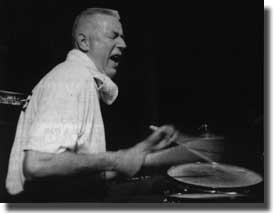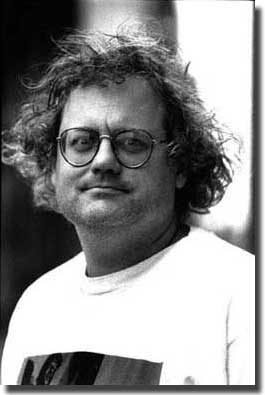|
Fri, 18 February 2005
 Euphonic Productions present: Euphonic Productions present:
Han Bennink & Eugene Chadbourne
9pm, Fri, Feb 18, 2005
Eyedrum
($10 at the door)
290 MLK Jr. Drive, Suite 8
404-522-0655
www.eyedrum.org Eyedrum's programming is supported in part by the City of Atlanta Bureau of Cultural Affairs
Photograph copyright Bill Smith
See pictures from the show.
Han Bennink
In the niche-oriented world of major-league jazz, it's almost unfashionable to be so multi-faceted a player as Han Bennink. Bennink is one of the unfortunately rare musicians whose abilities and interests span the music's entire spectrum, from Dixieland to free. His straight-ahead playing is absolutely convincing -- his time is solid, his sense of swing strong, and his technique flawless. He also possesses the requisite qualities of a free jazz virtuoso; Bennink's ability to interact quickly and creatively with horn players and pianists is great, as is his ear for timbral contrasts. What ultimately makes Bennink special is his manifest love for the music, a love that inclines him to tear down the cardboard walls that too often separate different schools of jazz. At his best, with colleagues who share his all-encompassing stylistic embrace, Bennink plays the continuum of jazz as an instrument unto itself.
Bennink began playing drums while in his teens under the influence of his father, a classical percussionist. He played with hometown musicians in the early '60s. Between 1962 and 1969, Bennink backed local American jazz greats like Dexter Gordon, Sonny Rollins, and Eric Dolphy on their visits to Holland (he was the drummer on Dolphy's Last Date album, from 1964). In 1963, he formed a quartet that included pianist Misha Mengelberg, which played the 1966 Newport Jazz Festival.
In the mid-'60s, Bennink began to play free jazz with the likes of Mengelberg and Willem Breuker. In 1967, those three founded the Instant Composer's Pool, a not-for-profit organization designed to promote the Dutch jazz avant-garde. Around that same period, Bennink began continuing associations with the saxophonist Peter Brotzmann, guitarist Derek Bailey, trombonist Alex Schlippenbach, trumpeter Don Cherry, and the Globe Unity Orchestra. In the '70s and '80s, Bennink led and played as sideman on a number of sessions on the FMP, Incus, and Soul Note labels; he made a notable contribution to Steve Lacy's Herbie Nichols tribute album, Regeneration, with Mengelberg, bassist Kent Carter, and trombonist Roswell Rudd. In the late '80s, Bennink started, with cellist Ernst Reijseger and saxophonist Michael Moore, the Clusone Trio, which has since become perhaps the percussionist's most ideal performance vehicle. Both Reijseger and Moore share Bennink's extraordinarily wide range of musical interests, to say nothing of his absurdist sense of humor. It is, in fact, Bennink's rather whimsical theatricality that mitigates -- for some, at least -- the seriousness
and depth of his art.
- Chris Kelsey, All Music Guide
www.hanbennink.com/
www.shef.ac.uk/misc/rec/ps/efi/mbennink.html
 Eugene Chadbourne Eugene Chadbourne
A seemingly endless -- and endlessly eclectic -- series of releases made the innovative guitarist Eugene Chadbourne one of the underground community's most well-known and well-regarded eccentrics. Born January 4, 1954 in Mount Vernon, NY, Chadbourne was raised in Boulder, CO, by his mother, a refugee of the Nazi death camps. At the age of 11, the Beatles inspired him to learn guitar; later exposure to Jimi Hendrix prompted him to begin experimenting with distortion pedals and fuzzboxes. Ultimately, however, he became dissatisfied with the conventions of rock and pop, and traded in his electric guitar for an acoustic one, on which he began to learn to play bottleneck blues.
Perhaps Chadbourne's most significant formative discovery was jazz; initially drawn to John Coltrane and Roland Kirk, he later became an acolyte of the avant excursions of Derek Bailey and Anthony Braxton. Despite the huge influence music exerted over his life, however, Chadbourne first studied to become a journalist, but his career was derailed when he fled to Canada rather than fight in Vietnam; only President Jimmy Carter's declaration of amnesty for conscientious objectors allowed the vociferously left-wing Chadbourne to return to the U.S. in 1976, at which time he plunged headlong into the New York downtown music scene. After releasing his 1976 debut, Solo Acoustic Guitar, he began collaborating on purely improvisational music with the visionary saxophonist John Zorn and the acclaimed guitarist Henry Kaiser.
Quickly, Chadbourne carved out a singular style, comprised of equal parts protest music, free improvisation, and avant-garde jazz, topped off with his absurd, squeaky vocals. A complete list of Chadbourne's countless subsequent collaborations and genre workouts is far too lengthy and detailed to exhaustively document, although in the early '80s he garnered some of his first significant attention as the frontman of Shockabilly, a demented rockabilly revisionist outfit which also featured the well-known producer Kramer. Following the group's breakup, Chadbourne turned to his own idiosyncratic brand of country and folk, accurately dubbed LSD C&W on a 1987 release, the same year he joined the members of Camper Van Beethoven for a one-off covers project. In addition, he recorded with artists ranging from Fred Frith and Elliott Sharp to Evan Johns and Jimmy Carl Black, the original drummer in the Mothers of Invention; in between, he continued exploring unique styles inspired by music from the four corners of the globe, all the while issuing a seemingly innumerable string of records, most of them on his own Parachute label.
- Jason Ankeny, All Music Guide
www.eugenechadbourne.com/

Home
|